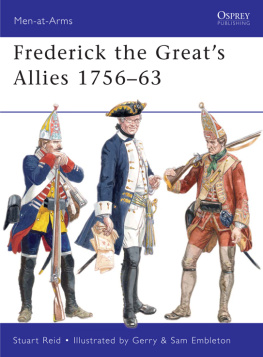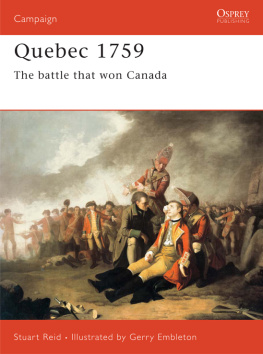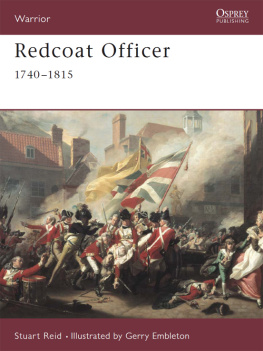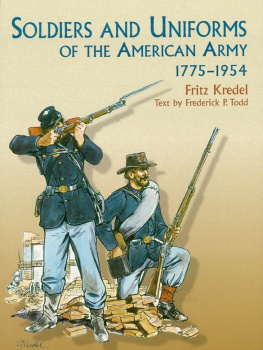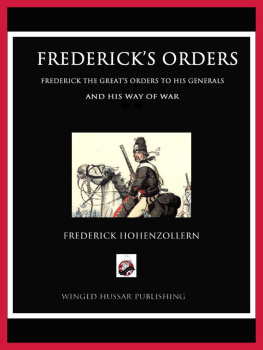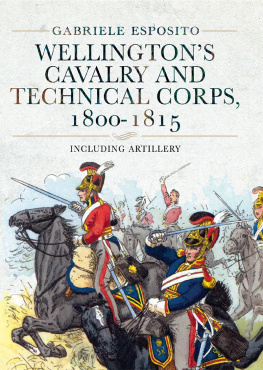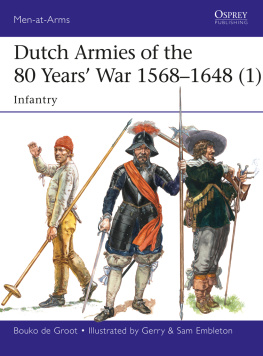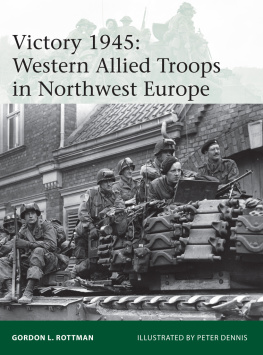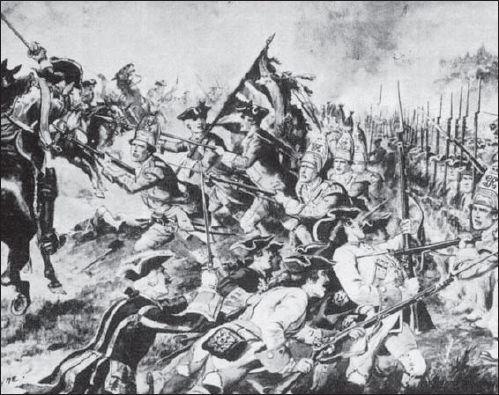Men-at-Arms 460
Frederick the Greats Allies 175663
Stuar t Reid Illustrated by Gerr y & Sam Embleton
Series editor Martin Windrow
CONTENTS
FREDERICK THE GREATS ALLIES 17561763
INTRODUCTION
A more valid title for this study might actually be His Britannic Majestys Army in Germany, for in reality Frederick II the Great of Prussia had very few allies during the Seven Years War, and all of them were grouped together into a single army, largely in British pay. This was led at first by King Georges son William Augustus, Duke of Cumberland, and subsequently by a Prussian general, the Erzhog Ferdinand of Brunswick.
The key to it all, however, was Hanover, whose monarchy was held simultaneously by King George II of England. As Elector of Hanover he was at peace with the world in 1756, but as King of England he was simultaneously engaged in a low-intensity war with France in the American colonies and in India. When this conflict began to escalate, France decided to retaliate by threatening King Georges vulnerable Electorate of Hanover. At that time a defensive alliance was still in force between France and Prussia, and it was tactfully suggested by the envoys of King Louis XV that if Frederick cared to invade Hanover, France would reciprocate by attacking his enemies in the Austrian Netherlands (modern Belgium). Hanover was all but defenceless, possessing no natural boundaries, and half her army was abroad protecting England against the illusory threat of French invasion. Nevertheless, Frederick, who had troubles enough of his own, declined this ingenious invitation, while kindly offering France the use of the Rhineland fortress of Wesel for any attempt she might care to make on her own account.
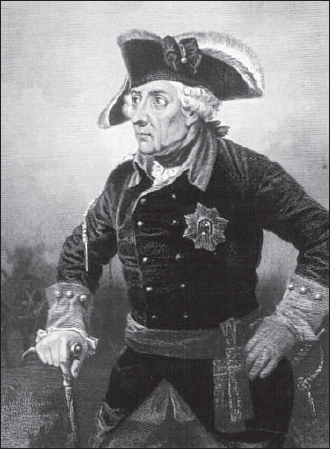
Frederick II the Great of Prussia (171386) was Ferdinand of Brunswicks brother-in-law, but also his superior, since Ferdinand was an officer of the Prussian army. Consequently, Old Fritz was sometimes wont to treat Ferdinand as a subordinate rather than as the commander of an allied force.
For his part, George IIs prime minister William Pitt initially responded to this threat by concluding a not very secret alliance with Russia, promising the Empress Elizabeth I a substantial financial subsidy for launching a seaborne invasion of Prussia in the event of any Prussian attack on Hanover. Then, with this precaution in place, the British ambassador presented Frederick with a full copy of the Russian treaty and an invitation to enter into a defensive alliance with Britain and Hanover, in order to neutralize this Russian threat and safeguard the Electorate Although this was a particularly blatant piece of blackmail, Frederick readily assented to the proposal, which made far more strategic sense for Prussia than the existing alliance with France. Thus rebuffed, Louis XV proceeded instead to enter into a defensive alliance with the Holy Roman Empire (Austria), with whom she had been intermittently at war for the past 200 years and more.
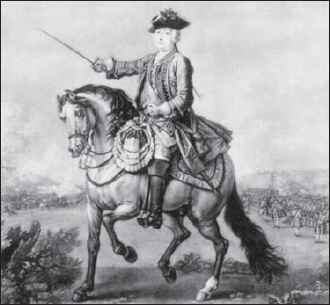
William Augustus, Duke of Cumberland, was the Allied armys first commander, until dismissed by King George II after failing to secure a victory at the battle of Hastenbeck; he then obeyed his royal fathers instructions to conclude a cease-fire.
With the old patterns of alliances completely turned on their heads, and with his western flank thus secured, Frederick of Prussia embarked upon an invasion of Frances ally Saxony in August 1756, thus beginning the Seven Years War.
See Men-at-Arms 48, Wolfes Army; MAA 313, Louis XVs Army (5) Colonial and Naval Troops; MAA 453, Armies of the East India Company 17501850; Warrior 85, American Colonial Ranger 172464; WAR 126, Highlander in the French-Indian War 175667; and Campaign 121, Quebec 1759.
CHRONOLOGY
| 1756: |
| 16 Jan | Britain and Prussia sign Convention of Westminster |
| 1 May | France and Austria (Empire) sign Treaty of Versailles |
| 19 June | Prussian mobilization begins |
| 28 Aug | Prussia invades Saxony, beginning the Seven Years War |
| 1757: |
| 25 Mar | French hussars exchange fire with garrison of Geldern |
| 14 Apr | Duke of Cumberland assumes command of Hanoverian Army |
| 26 July | After French and Imperialists invade Hanover, Cumberland is narrowly defeated by Marshal dEstres at Hastenbeck |
| 10 Sept | Armistice with French signed at Kloster Zeven |
| 5 Nov | (Prussians defeat French and Imperialists at Rossbach) |
| 23 Nov | Ferdinand of Brunswick assumes command of Allied army |
| 26 Nov | Allied breakout begins, leading to French withdrawal |
| 5 Dec | (Prussians defeat Imperialists at Leuthen) |
| 1758: |
| 12 June | Allied victory at Krefeld |
| 23 July | French victory at Sandershausen |
| 3 Aug | First British contingent disembarks at Emden |
| 10 Oct | French victory at Lutterberg |
| 1759: |
| 13 Apr | French victory at Bergen, near Frankfurt |
| 1 Aug | Allied victory at Minden |
| 12 Aug | (Russians and Imperialists defeat Prussians at Kunersdorf) |
| 1760: |
| 10 July | French victory at Korbach |
| 16 July | Allied victory at Emsdorf |
| 31 July | Allied victory at Warburg |
| 5 Sept | Allied raid on Zierenberg |
| 16 Oct | Allies checked at Kloster Kamp |
| 25 Oct | (King George II of England is succeeded by George III, who will gradually abandon alliance, reducing subsidies to Prussia and withdrawing British troops) |
| 3 Nov | (Prussians win costly victory at Torgau) |
| 1761: |
| 16 June | Allied victory at Vellinghausen |
| Oct | Allied army forced to retreat to Brunswick |
| 1762: |
| 5 Jan | (Empress Elizabeth of Russia succeeded by Tsar Peter III, who opens peace negotiations with Prussia) |
| 22 May | (Treaty of Hamburg Sweden withdraws from anti-Prussian alliance) |
| 24 June | Allied victory over French at Wilhelmsthal |
| 9 July | (Empress Catherine II deposes Tsar Peter, but does not renew war with Prussia) |
| 21 July | (Prussians defeat Imperialists at Burkersdorf) |
| 23 July | Allied victory over French at Lutterberg |
| 30 Aug | French victory over Allies at Nauheim |
| 21 Sept | French capture Amoneburg |
| Oct/Nov | Allied army drives French back over Rhine |
| 15 Nov | Armistice signed between Allied and French forces |
| 1763: |
| 16 Feb | With all belligerents exhausted, Treaty of Hubertusburg between Prussia and Holy Roman Empire finally ends Seven Years War |

